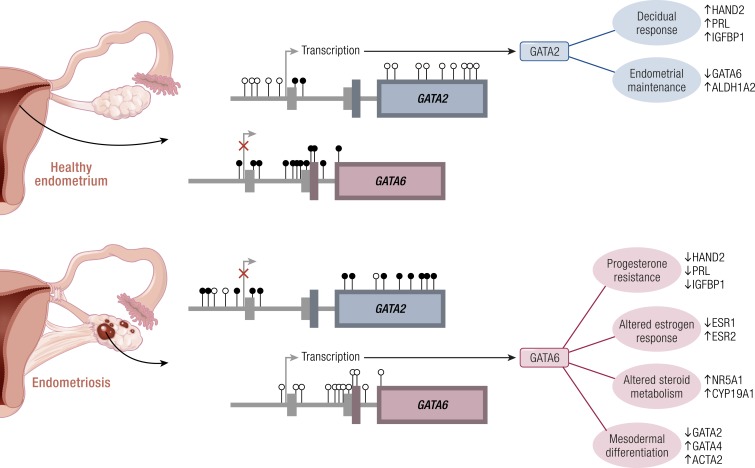Figure 9.
An epigenetic switch from GATA2 to GATA6 in endometriosis. In endometrium, the GATA2 gene is characterized by a lack of DNA methylation (○). In contrast, endometriosis has hypermethylated CpGs throughout a CpG island and proximal sequences within the GATA2 promoter and throughout the gene. Several regions of the GATA6 gene are completely methylated in endometrium, whereas methylation was absent within three CpG islands and their shores within the body of the gene. As a result, GATA2 is expressed in healthy cells and upregulates several genes involved in decidualization; GATA2 may also maintain the expression of aldehyde dehydrogenase 1 family, member A2 (ALDH1A2), which is a key enzyme in retinoid metabolism. In endometriotic cells, aberrant methylation permits expression of GATA6. GATA6 regulates the expression of several genes involved in steroid metabolism, the nuclear steroid hormone receptors, and other GATA family members. Ectopic expression of GATA6 drives a pattern of gene expression similar to that seen in endometriotic tissues, essentially transforming healthy endometrium away from spontaneous decidualization and toward the disease phenotype. [Reproduced from Dyson MT, Roqueiro D, Monsivais D, et al. Genome-wide DNA methylation analysis predicts an epigenetic switch for GATA factor expression in endometriosis. PLoS Genet. 2014;10(3):e1004158. Copyright © 2014 by Dyson et al. This is an open access article distributed under the Creative Commons Attribution License, which permits unrestricted use, distribution, and reproduction in any medium, provided the original work is properly cited.]

